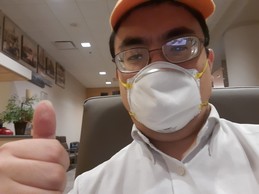| Daniel Alrick had some pain in his arm after his first dose of the COVID-19 vaccine but, he says, it was “no worse than a flu shot.”
“As a person with a disability, I felt very fortunate,” he says. “Everything was arranged; the only thing we were responsible for was transportation.” He managed to carpool for the drive from Ashland to Medford, where he and everyone in his apartment was vaccinated. “In our living situation, we have a lot of shared space. We were very proud that for all of the last year no one got the virus. It was good all getting vaccinated together.” Daniel was one of several people with developmental disabilities we spoke with about getting vaccinated. As self-advocates, they help themselves and others make informed life choices. |
| “There’s so many lies circulating about the vaccine,” says Gabrielle Guedon, “but our self-advocacy groups gave people the facts so they could make the right choice for themselves.”
She needed help navigating the process to get an appointment but says that after receiving the vaccine, “I feel less isolated.” The fact that adults with developmental disabilities are prioritized in vaccine sequencing, she adds, “made me feel valued.” |
 |
 Sherri Osborn went with her provider to the Portland airport for her shot. A wait of more than three hours meant that they had to drive to a store to find a bathroom. “Move your arm around a lot, after,” she advises. “It helps with soreness.” Sherri Osborn went with her provider to the Portland airport for her shot. A wait of more than three hours meant that they had to drive to a store to find a bathroom. “Move your arm around a lot, after,” she advises. “It helps with soreness.”
Eddie Plourdes is chair of the self-advocacy caucus of the Oregon Council on Developmental Disabilities. He used a wheelchair to travel the short distance from his care home to a clinic to get his first shot. |
He is passionate about getting the word out to people in the disability community that they are eligible for the vaccine but cautions, “We need to wear our masks till everybody is vaccinated.”
He is looking forward to the day when “I can see everybody’s smiles without their masks.”
 |

Need help getting to a vaccine clinic?
Adults with intellectual and developmental disabilities may be wondering how to get to a vaccine clinic. Here are some options for you:
- If you are enrolled in Oregon Health Plan (OHP), you can use Non-Emergent Medical Transportation (NEMT) to get to a clinic and get back home. Here is a map of NEMT brokerages. Generally, NEMT must be scheduled and authorized ahead of time. You can call the brokerages directly to schedule a ride.
- If you receive Medicaid-funded in-home support through the Office of Developmental Disabilities Services, you can ask your Medicaid-funded in-home provider to take you to a clinic and to wait with you at the clinic.
Did you lose food purchased with SNAP during a power outage?
The Oregon Department of Human Services (ODHS) is able to replace food purchased with Supplemental Nutrition Assistance Program (SNAP) benefits if there was a loss of food due to the recent power outages.
Food may be replaced for SNAP recipients who:
- Lost food due to a power outage, home damage or other misfortune
- Make a request to replace the food loss within 10 days of the date the food is destroyed in a household misfortune.
SNAP households that lost or tossed food that was unsafe to eat can request SNAP replacement benefits – but they need to do so within 10 days of the loss.
More information is available online.


